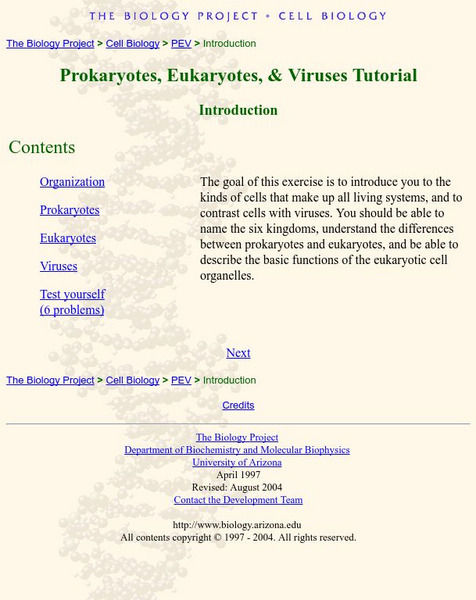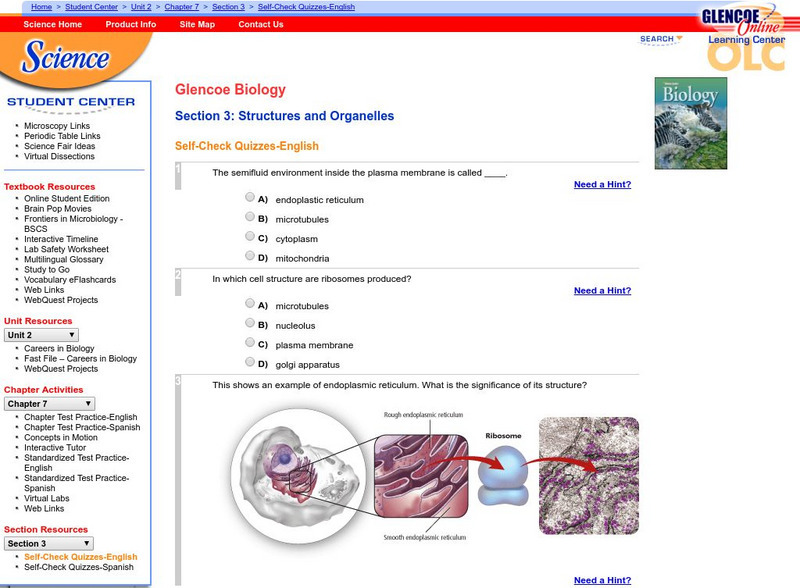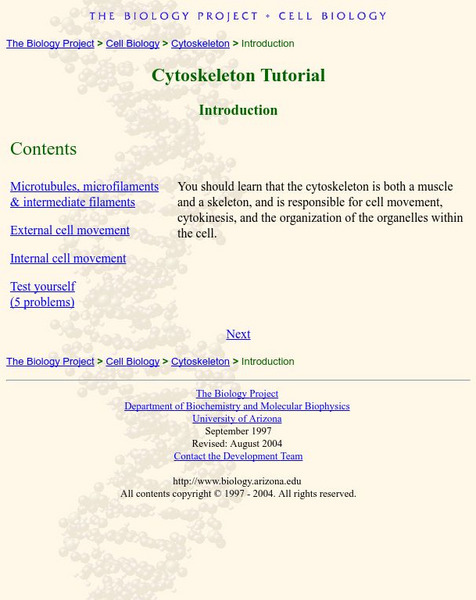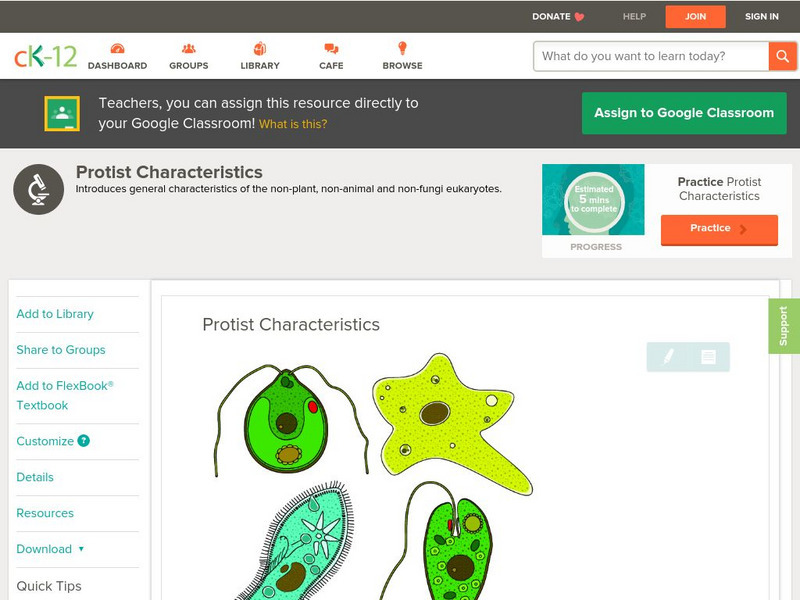Hi, what do you want to do?
University of Arizona
Prokaryotes, Eukaryotes, & Viruses
This tutorial compares prokaryotic and eukaryotic cellular organization and contrasts cells with viruses. Includes a practice quiz to test your knowledge.
BiologyWise
Biology Wise: The Structure and Functions of a Cell Nucleus
The parts of a cell nucleus are described along with a list of the functions of a cell nucleus.
BiologyWise
Biology Wise: The Cell Wall Functions in Plants and Animal
Describes the composition and functions of cell walls in plants, algae, fungi, and bacteria.
BiologyWise
Biology Wise: Vacuole Structure
The structure and function of a vacuole inside a plant cell are described.
BiologyWise
Biology Wise: The Major Functions of Lysosomes
Explains what lysosomes are, the different functions they perform in a cell, and what can happen when they become dysfunctional.
BiologyWise
Biology Wise: A Labeled Diagram That Explains Function of Nucleolus
Explains what the cell nucleolus is, its functions, and its structure.
BiologyWise
Biology Wise: Vacuole Analogy
Explains what vacuoles are and what their functions are in animal cells and plant cells, and offers analogies to help students understand their different roles.
BiologyWise
Biology Wise: Functions of the Golgi Body
The characteristics and functions of the Golgi apparatus are described.
BiologyWise
Biology Wise: Lysosome Analogy
Presents information about lysosomes and offers analogies to help students recall their functions in a cell.
BiologyWise
Biology Wise: Vacuole Facts
Presents information about vacuoles and offers analogies to help students recall their functions in a cell.
BiologyWise
Biology Wise: Facts and Functions of the Golgi Apparatus
The structure and functions of the Golgi apparatus are described. Includes a list of interesting facts.
BiologyWise
Biology Wise: Mitochondria Functions
Describes the structure and functions of the mitochondria.
BiologyWise
Biology Wise: Mitochondrial Function
Describes the structure and functions of the mitochondria.
BiologyWise
Biology Wise: Mitochondrial Matrix
Discusses the structure of the matrix inside a mitochondrion and how hundreds of concentrated enzymes are held there. The matrix takes part in mitochondrial functions such as the Krebs cycle, the electron transport chain, ATP synthesis,...
McGraw Hill
Glencoe Biology: Structures and Organelles: Self Check Quiz
This multiple-choice quiz on cell structures and organelles allows students to get hints for each question and check their answers after submitting.
Sumanas
Sumanas Inc: Discover Biology: Vesicle Budding and Fusing
Tutorial with animated illustrations showing how vesicles work to transport materials inside a cell and release them through the cell's membrane to the outside.
Ducksters
Ducksters: Biology for Kids: Cell Nucleus
Explore the cell nucleus in the science of biology on this site. Learn how this organelle is the control center of the cell, storing the DNA and hereditary information inside chromosomes.
Ducksters
Ducksters: Biology for Kids: Cell Ribosome
Kids learn about cell ribosome in the science of biology. This organelle acts like a tiny factory making all sorts of different proteins for the cell using RNA and amino acids.
Khan Academy
Khan Academy: The Endomembrane System
Article looks at the structure and function of the different parts of the endomembrane system, how proteins, lipids, and vesicles are transported between these parts, and how this activity keeps the cell running smoothly.
Khan Academy
Khan Academy: The Cytoskeleton
There are three types of protein fibers in the cytoskeleton: microfilaments, intermediate filaments, and microtubules. This resource examines each type of filament, as well as some specialized structures: flagella, cilia, and centrosomes.
University of Arizona
University of Arizona: Cytoskeleton Tutorial
In this interactive tutorial you will discover that the cytoskeleton is both a muscle and a skeleton, and is responsible for cell movement, cytokinesis, and the organization of the organelles within the cell.
CK-12 Foundation
Ck 12: Life Science: Archaea
[Free Registration/Login may be required to access all resource tools.] For many years, archaea were classified as bacteria. Like the bacteria, archaea lacked a nucleus and membrane-bound organelles and, therefore, were prokaryotic...
CK-12 Foundation
Ck 12: Life Science: Protist Characteristics
[Free Registration/Login may be required to access all resource tools.] Protists are eukaryotes, which means their cells have a nucleus and other membrane-bound organelles. Most protists are single-celled. Other than these features, they...















